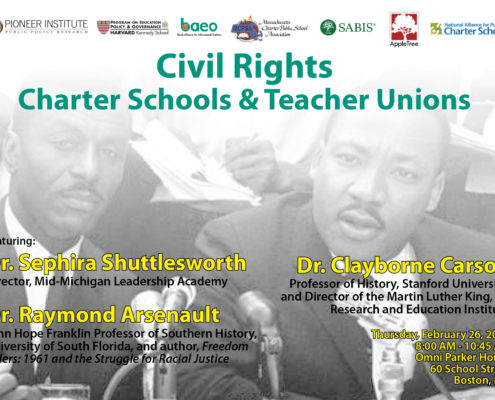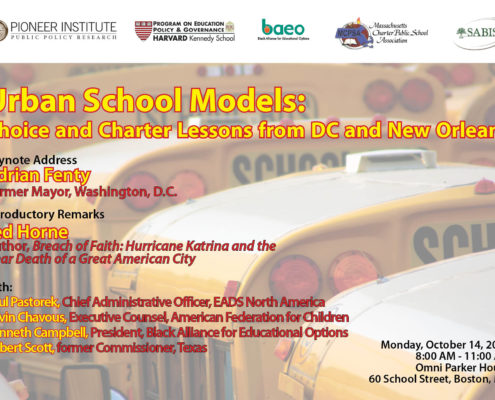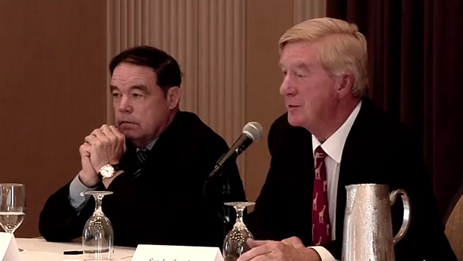Study: MA Charter Public Schools Have Lower Attrition Rates Than Sending School Districts
Charters also seeing higher special needs enrollment, helping those students achieve strong outcomes
BOSTON – Data from the state Department of Elementary and Secondary Education (DESE) show that Massachusetts charter public schools have lower attrition rates than the district schools from which their students come, according to a study published by Pioneer Institute.
“These data disprove the false argument that the charter schools only outperform their district counterparts because charters supposedly ‘push out’ students who are less likely to perform well academically and on state tests,” said Dr. Cara Candal, author of “Attrition, Dropout and Student Mobility in District and Charter Schools: A Demographic Report.”
DESE has been tracking attrition since the 2010-11 school year and finds that charter school attrition (the rate at which schools lose students from one year to the next) is dropping and approaching the statewide average. Charters would be expected to have higher attrition rates because they are disproportionately located in urban areas.
Boston charter schools have a lower overall weighted attrition rate than the Boston Public Schools (BPS) and it is also lower for 8 out of 12 grade levels.
Boston charter schools also have a lower dropout rate and higher graduation rate compared to BPS. Charters have a four-year graduation rate of 81 percent and a five-year 91 percent graduation rate. BPS’ four- and five-year graduation rate is 76 percent.
The data show that charter public schools are recruiting increasingly diverse student bodies and helping those students achieve strong outcomes.
In the wake of 2010 state legislation that requires districts to share student addresses with charter public schools and obliges charters to demonstrate efforts to recruit and retain English language learners (ELLs) and students with disabilities, charter public schools have been educating more of those students.
If the current enrollment pattern continues, Boston charter public schools are on track to serve the same percentage of ELLs as BPS. Boston charters are already approaching parity when it comes to students with disabilities, who make up 16 percent of their student population, compared to 19 percent at BPS.
A 2015 study of Boston schools by MIT researcher Elizabeth Setren found that “special needs students are overall similarly or less mobile in charters,” and that special needs students in Boston charters outperform their BPS counterparts. Setren also concluded that attrition is “unlikely” to drive the excellent results Boston charter public schools achieve.
It would be reasonable to expect that charter schools would see decreasing test scores as they educate increasing numbers of ELLs and students with disabilities, but Boston charters continue to outperform BPS.
About the Authors
Cara Stillings Candal is an education researcher and writer. She is a senior consultant for research and curriculum at the National Academy of Advanced Teacher Education and a senior fellow at Pioneer Institute. She was formerly research assistant professor and lecturer at the Boston University School of Education. Candal holds a B.A. in English literature from Indiana University at Bloomington, an M.A. in social science from the University of Chicago, and a doctorate in education policy from Boston University.
Ken Ardon received a Ph.D. in economics from the University of California at Santa Barbara in 1999, where he co-authored a book on school spending and student achievement. He taught economics at Pomona College before moving to Massachusetts, and from 2000 to 2004, Dr. Ardon worked for the Commonwealth of Massachusetts in the Executive Office of Administration and Finance. He is a professor of economics at Salem State University, where he has taught since 2004. Dr. Ardon is a member of Pioneer Institute’s Center for School Reform Advisory Board.
About Pioneer
Pioneer Institute is an independent, non-partisan, privately funded research organization that seeks to improve the quality of life in Massachusetts through civic discourse and intellectually rigorous, data-driven public policy solutions based on free market principles, individual liberty and responsibility, and the ideal of effective, limited and accountable government.
Get Updates on Our Charter Schools Initiative
Related Research


















